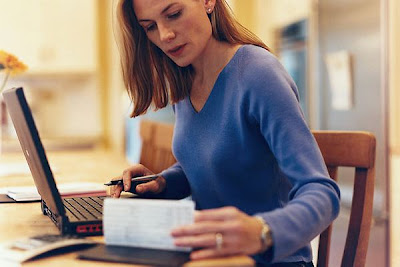Online bill payment is safer, easier, and cheaper than mailing checks.
Living here on retirement island, I hear the phrase "dagnabbit!" a lot, either literally or metaphorically. I was talking with an oldster the other day, and they said, "Dagnabbit! I don't like this online bill payment idea! Suppose the computers go haywire?"
Haywire. That's the mentality I am dealing with here. Yes, old Univac will go beserk, saying "This does not compute! This does not compute!"
Thanks for playing, gramps. Sure its not time for a nice dirt nap?
Yes, back in the 1990's, I was skeptical of online bill payment. But back then, getting on the Internet was, for many of us, a hassle of dial-up modems and slow net speeds. And only a few merchants had online bill payment and the techniques were pretty crude.
Today, almost everyone can be paid online - even people who are not online. You can instruct your bank to mail a check to someone, free of charge, simply by clicking a mouse.
Electronic billing allows you to receive your bills electronically, view them online, and also download them, if you want to (why bother). And you can instruct your bank to pay the bill the day it is due, and not one day before or after. It is a very easy to use system.
But what about the old-fashioned way? If the utility company mails you a bill, there is a chance (a small one) it may get lost in the mail, or delayed. If so, you won't get the bill on time, and you may be socked with late fees. In addition, if you are away on vacation, you may miss these bills as well, resulting in late fees or other problems. Electronic billing, on the other hand, doesn't rely on the post office for delivery, and you can check your bills anywhere there is a computer - at a hotel, friend's home, even the local public library.
But what about the safety and security of sending a check? It is illusory. First of all, the same postal service problems apply with mailing checks - they can be lost or delayed, resulting in late fees. For a credit card, this can mean "rate jacking" which is no laughing matter. Or, if you usually pay off your balance, a late payment could mean interest fees being applied.
But second of all, under Check-21, a check is no longer a "paper trail" of payment, but instead a request for an electronic transfer of money. If you handed me a piece of paper with the name of a payee on it, and the amount they were to be paid, and asked me to go online and pay them, well, that is basically the same thing as a check these days. Banks no longer save and return checks, but shred them instead. So there is no "paper trail" of payment anymore. In fact, many stores, such as WalMart, when presented with a check, simply scan it and hand it back to you. You might as well just use a debit card.
And what about cost? A first class stamp is like what, 44 cents these days? Say you pay five bills a month. That comes out to $26.40 a year - enough to buy you a nice lunch with a beer at a fairly nice restaurant. Hmmm... free meal, I'll take that!
But wait, there's more! Many companies, in an effort to get you to use electronic statements, will offer discounts in fees and prices if you agree to go paperless. So you get reduced or waived bank fees if you get your statements online instead of by paper. So there are savings on both ends of the deal.
Online billing and bill payment has put a serious dent in the Post Office's business, and this is to be expected. But it is the wave of the future. No, actually the wave of the present. Probably less than half of the people out there are using paper billing and payments these days, and the number is decreasing rapidly.
As for record-keeping, it is true that your checkbook register or carbons do provide a record of your transactions. But you should be using some sort of financial software, like Quickbooks, to balance your accounts and keep track of your spending. Such records will help you track bills and payments far easier than any checkbook registers or carbons ever will. Some banks even offer services whereby you can "snyc" programs like Quicken with your bank account online, to balance your accounts.
If you are still paying bills by paper check and mail, not only are you not as secure as a person paying online, you are less so. And, you are spending more money, not to mention time, doing so. You are better off just going electronic, as it is faster, cheaper, easier, and allows you to track your spending and budget a lot easier.
And if you say "Dagnabbit!" to that idea, well, rest assured that you won't have to deal with the issue for long, as you likely already have one foot in the grave, gramps.



